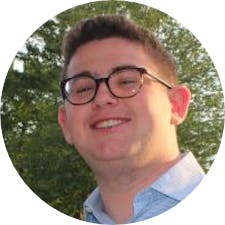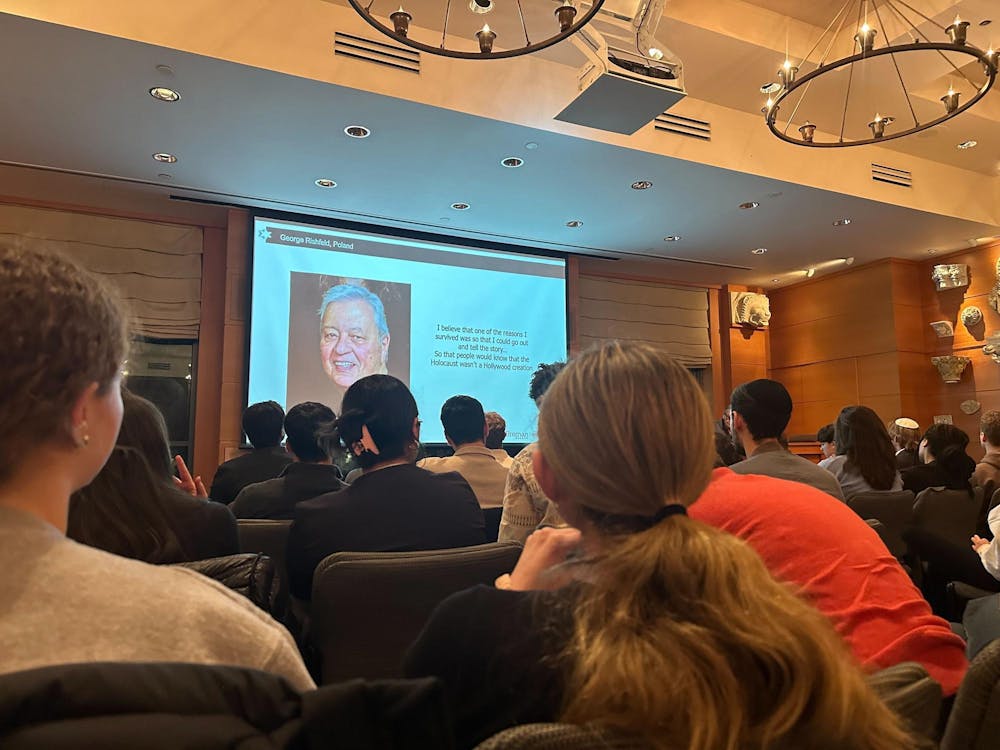On International Holocaust Remembrance Day, Jan. 27, almost 160 students, faculty and community members gathered in Emory University’s Ackerman Hall to witness a living survivor’s account of the Holocaust, an increasing rarity in 2025. George Rishfeld, an 85-year-old Holocaust survivor, told his story of struggle and strength from his time in the Warsaw Ghetto in Poland.
The event was co-sponsored by Emory’s Chaplaincy, the Office of Diversity, Equity, and Inclusion, the Tam Institute for Jewish Studies, Chabad at Emory, Emory Hillel and MEOR Emory.
Paige Scanlon (25C) and Agustin Zelikson (22Ox, 25C), both of whom studied abroad in Poland, and Jewish Chaplain Rabbi Jordan Braunig spoke before Rishfeld.
International Holocaust Remembrance Day commemorates the victims of the Holocaust and other Nazi persecution on the anniversary of the liberation of the Auschwitz concentration camp. 2025 marks 80 years since Soviet soldiers freed prisoners from the death camp.
Braunig began with remarks on the importance of remembering the genocide of Jews and other groups in Nazi Germany. He emphasized the fragility of hearing perspectives like that of Rishfeld, recognizing the ever-dwindling number of living Holocaust survivors — estimates put the number close to 245,000 survivors, with a median age of 86.
“We have the opportunity to bear witness to a story of survival and to be reminded of the miraculousness of human resilience, of life beyond the unimaginable and joy in the aftermath of sorrow,” Braunig said.
Rishfeld began his speech with stories from his time growing up in Warsaw, Poland. Born to a Jewish fur factory owner, he escaped the Warsaw Ghetto as a child when his parents threw him over a barbed-wire fence. He ultimately survived after a different family sheltered him. Rishfeld shared stories of the fear and constant hiding he endured, as well as loss, such as when a Nazi soldier shot his aunt and infant cousin.
“My father and my mother made a vow towards each other,” Rishfeld said. “We’re going to survive this thing, and at least one of us is going to escape.”
Rishfeld’s parents both survived. After the war, his family fled to Brussels and eventually settled in Brooklyn, N.Y. Rishfeld went on to join the military at Fort Chaffee, Ark. during the Civil Rights Movement. He eventually got married and had two daughters and six grandchildren. During the Q&A session after the talk, he attributed his survival to luck.
“What I’ve learned, and I learned from my father and from my 85 years on this earth, 80% of life is luck,” Rishfeld said. “The rest you plan on, alright? Because you never know what’s going to happen.”
Rishfeld concluded his speech by discussing antisemitism and violence against Jews since Oct. 7, 2023, calling it “the worst rise in the level of antisemitism globally since the Holocaust.” Rishfeld urged attendees to fight against hatred and ensure future generations are aware of stories like his to prevent a “new Holocaust.”
Scanlon and Zelikson spoke about their experiences studying abroad in Poland through the Tam Institute. Zelikson, a descendant of Holocaust survivors, discussed visiting the Majdanek concentration camp and the “horrendous” sight of large shower rooms and gas chambers still stained by blue Zyklon B. Zelikson discussed how he found meaning and strength in this experience.
“At that moment, I wasn’t Orthodox, Conservative, Reform,” Zelikson said. “At that moment, I was a Jew — a Jew who is proud to be so. Someone who should not be there but who instead was wearing a kippah at a place designed to eliminate his identity off the face of the earth.”
Scanlon said that the experience helped her view Jewish history through a lens of hope rather than just suffering.
“I learned through this brief study abroad program how central and vital it is to view Jewish life through the lens of flourishing and presence when possible instead of strictly through the lens of absence and loss,” Scanlon said.
During the Q&A, Rafael Escoto (27C) asked Rishfeld how “humanity failed in honoring the memory of the Holocaust” and how to prevent “history’s darkest tales” from repeating themselves. Rishfeld emphasized the importance of education as a weapon against denial and ignorance.
“It has to be told because you don’t want it to happen again,” Rishfeld said. “The only way to do it is to talk about it. The only way to do it is to read about it. The only way to do it is to write about it. … You have to let the whole world know.”
During an interview with The Emory Wheel, Isabel Levine (28C) shared a similar sentiment to Rishfeld on the value of storytelling to continue the memory of the Holocaust. She described how talking to her mother, who traveled to Poland and visited concentration camps, impacted her, and she praised Rishfeld for pushing for more Holocaust education.
“It’s really important to me and to my Jewish identity to never forget about the Holocaust,” Levine said. “A lot of it gets scraped under the rug, especially in curriculum, because a lot of grades just aren’t really taught it anymore.”
Levine hopes to become more involved in the Jewish community and spread Rishfeld’s story to combat misinformation about the Holocaust.
“It’s cliche, but just never forget,” Levine said.
Rishfeld highlighted the importance of continuing to tell the stories of the Holocaust.
“Hear the story, tell a story,” Rishfeld said. “Do what you can when you can to help our children and their children to know the story and remember, for their own sake, that even in the face of evil and death, choose life that you may live.”

Jacob Muscolino (he/him) (28C) is a News Editor at The Emory Wheel. He is from Long Island and plans to major in History and Psychology. Outside of the Wheel, he is involved in Emory Reads and Emory Economics Review. You can often find Jacob watching the newest blockbuster for his Letterboxd, dissecting The New York Times and traveling to the next destination on his bucket list.






